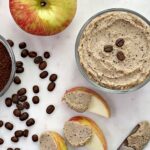 February marks the 10th anniversary of the American Heart Association’s Go Red For Women Movement. The movement aims to educate women about the seriousness of heart disease, which includes both strokes and heart attacks.
February marks the 10th anniversary of the American Heart Association’s Go Red For Women Movement. The movement aims to educate women about the seriousness of heart disease, which includes both strokes and heart attacks.
- Heart disease is the #1 killer of Americans
- Heart disease is the #1 killer of women
- Heart disease kills more women than men
- Heart disease kills women at an average rate of one per minute
- Heart disease kills more women than all kinds of cancer combined
Each year, more than two million heart attacks and strokes take place resulting in 800,000 deaths. Research shows that one in every three deaths results from heart disease and stroke.
The good news is that of all the things we can do to improve our heart health and prevent this disease, eating the right foods may be the easiest.
Here are some fabulous super foods that are ready to help improve your heart health!
Blueberries
All berries are rich in heart-healthy fiber and antioxidants, but blueberries outshine the rest. Blueberries contain anthocyanins, the antioxidant which gives this fruit its dark blue color. The anthocyanins in blueberries have been found to:
- Suppress inflammation
- Lower “bad” low-density lipoprotein cholesterol levels
- Decrease blood pressure and dilate blood vessels
These factors help to reduce the risk for heart attack and stroke. According to one recent study, women aged 25 through 42 who ate more than three servings of blueberries and strawberries a week had a 32% lower risk of heart attack compared with those who ate less. Blueberries are also a good source of fiber, vitamin C, potassium, manganese and plenty of other nutrients.
Oatmeal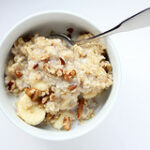
Oatmeal is high in folate, omega-3 fatty acids and soluble fiber. The soluble fiber acts like a sponge in the digestive tract and soaks up the cholesterol so it is eliminated from the body and not absorbed into the bloodstream. In addition to lowering “bad” cholesterol levels, eating oatmeal lowers blood pressure and may help prevent diabetes. One serving of oatmeal has 5 grams of heart-healthy fiber which will keep your blood sugar stable and your stomach full. Stick with coarse or steel-cut varieties when choosing an oatmeal; they contain more nutrients and fiber than instant alternatives which usually contain added sugars and salt.
 Nuts
Nuts
This includes almonds, walnuts, pistachios, peanuts and macadamia nuts, all of which contain heart healthy fiber. Nuts include plenty of heart-healthy monounsaturated fats and low levels of saturated fats. They also contain vitamin E, which helps lower “bad” LDL cholesterol. And some, like walnuts, are high in omega-3 fatty acids. Eating a handful of almonds each day has been found to lower “bad” cholesterol by as much as 9 percent. Look for varieties that don’t have a lot of added salt.
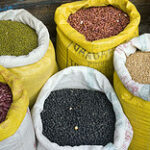 Legumes
Legumes
Because they come from plants, legumes such as beans, lentils, and peas are an excellent source of protein without a lot of unhealthy fat. They are low in fat, high in soluble fiber, and help improve cholesterol levels. Legumes, especially, make a great meat substitute because, like meat, they are rich in protein; however, because legumes are also packed with fiber, while meat is not, beans are digested more slowly. This makes you feel full longer and makes it easier to lose weight. One study found that people who ate legumes at least four times a week had a 22% lower risk of heart disease compared with those who consumed them less than once a week. And legumes may help control blood sugar in people with diabetes. Lowering blood sugar levels is key in helping people avoid diabetes complications, one of which is heart disease. Look for the more colorful beans (red and purple) because they usually contain extra flavonoids, the chemicals that act as antioxidants and can protect against heart disease.
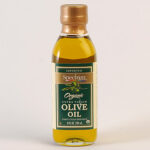 Extra-Virgin Olive Oil
Extra-Virgin Olive Oil
In a landmark study, people at high risk for heart disease who followed the Mediterranean diet (high in grains, fruits, vegetables) supplemented by nuts and at least four tablespoons a day of olive oil reduced their risk of heart attacks, strokes, and dying by 30%. Olive oil is a good source of monounsaturated fats, which can help lower LDL cholesterol, reduce blood sugar levels and prevent blood from clotting in the arteries, which leads to heart attack. At the grocery store, make sure to pick out extra-virgin or virgin olive oil since they are less processed and contain more polyphenols, antioxidants that can help reduce inflammation.
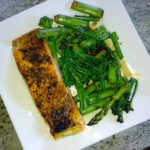 Salmon
Salmon
Salmon, and other fatty fish such as sardines and mackerel, are a rich source of omega-3 fatty acids, shown in studies to:
- Lower the risk of arrhythmia (irregular heart beat)
- Decrease atherosclerosis (plaque build-up in the arteries)
- Decrease triglycerides
- Reduce high blood pressure
- Normalizing glucose levels
- Increase your levels of high-density lipoprotein (HDL) aka “good cholesterol”
Salmon is also rich in vitamin A, riboflavin (vitamin B2), vitamin B6, vitamin B12, and niacin. The American Heart Association recommends eating fish and preferably fatty fish at least twice a week.
 Dark Leafy Greens
Dark Leafy Greens
Green vegetables are high in carotenoids, which act as antioxidants and free your body of potentially harmful compounds. They are also high in fiber and contain tons of vitamins and minerals. Spinach is packed with potassium, calcium, fiber, B-complex vitamins—a combo that not only defends your heart, but also helps fights disease and protects your eyesight. Spinach is also rich in folate — a nutrient which can lower the levels of homocysteine (high plasma levels of homocysteine is a risk factor for CVD) in your bloodstream. Other dark leafy greens including collard greens and kale are also good sources of fiber, vitamins, minerals, antioxidants and omega-3 fatty acids.
 Tomatoes
Tomatoes
Tomato consumption in the U.S. has been rising and that’s a good thing. Tomatoes are low in calories, low in sugar, and high in heart-healthy potassium. They are also a good source of the antioxidant lycopene, which is a carotenoid that may help get rid of “bad” cholesterol, keep blood vessels open, and lower heart attack risk.
 Pomegranates
Pomegranates
Pomegranates contains numerous antioxidants, including heart-promoting polyphenols and anthocyanins which may help stave off hardening of the arteries. One study of heart disease patients found that a daily dose of pomegranate juice over three months showed improvements in blood flow to the heart.
 Green Tea
Green Tea
Green tea is filled with good-for-you catechins and flavonols. One recent study found that people who drank four or more cups of green tea daily had a 20% reduced risk of cardiovascular disease and stroke compared with people who “seldom” imbibed the beverage. The findings echo a previous study that found lower rates of death, including death from heart disease, among avid drinkers of green tea.
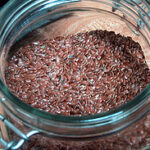 Flax Seeds
Flax Seeds
Flax seeds and chia seeds are high in omega-3 fatty acids and fiber. Omega-3 fatty acids lower the level of triglycerides in the bloodstream which are associated with diabetes and heart disease. Additionally, omega-3 fatty acids keep platelets from clumping together which helps to decrease risk of clogged arteries.
 Dark Chocolate
Dark Chocolate
This is my favorite superfood! Dark chocolate made up of at least 60-70% cocoa contains flavonoids called polyphenols, which may help lower blood pressure, prevent clotting, and reduce inflammation. Several studies have shown that dark chocolate may benefit your heart, including a study in 2012 that found that daily chocolate consumption could reduce nonfatal heart attacks and stroke in people at high risk for these problems. Aim to limit your serving to 1 ounce.
It is clear that healthy eating can make a huge difference with heart health.
Please comment below and share what you doing to improve your heart health!



